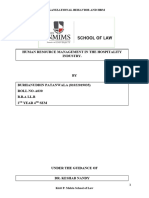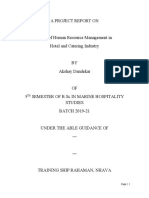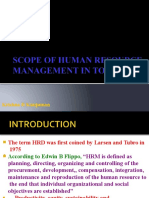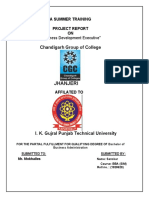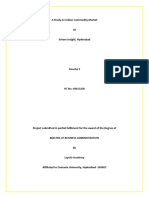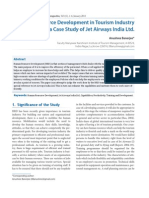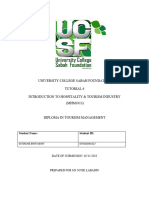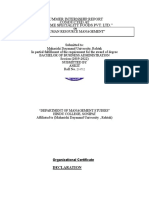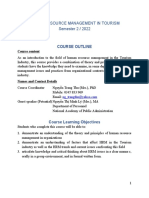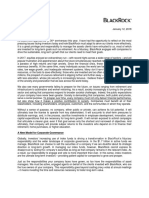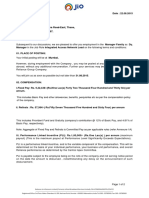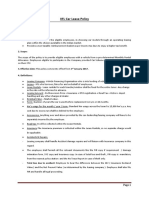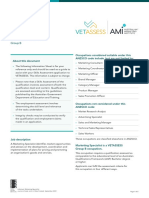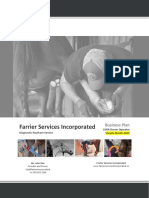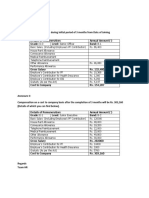Introductions
Human resource management (HRM) is a field of study that focuses on all the dynamics that
occur in the workplace, including recruitment, selection, training and development; performance
management and reward systems; employee relations; employee wellness and employee
participation.
The tourism Industry is one of the most rapidly growing industries in India. The industry has
been recognized as such due to its contribution towards nation building and development through
sustainable growth. It also provides employment opportunities to millions of people in rural areas
across the country. However, with this rapid growth comes risks associated with it. Tourism has
been known to attract large numbers of foreign nationals who can bring about cultural diversity
and economic prosperity for the country but at times also pose challenges due to their cultural
differences from Indian nationals (Chan & Yeung 2012).
The lack of proper training on how to manage these cultural differences could result in negative
outcomes for both parties involved. This paper will discuss some of these issues by looking at
how HRM plays an important role in managing these issues efficiently and effectively.
The human resource management (HRM) of the tourism industry in India is a challenging task.
The country’s tourism industry is at a nascent stage, with only 8% of its population having
visited foreign countries and even fewer having taken an overseas trip. This poses a challenge for
companies that want to take advantage of this untapped market.
Moreover, India has not yet developed an adequate talent pool for the tourism industry. In fact,
only about 7% of Indians have had any exposure to international travel: 6% have been abroad at
least once in their lifetime, while 3% have travelled abroad more than once.
These factors can be seen as challenges for any company trying to attract potential employees
into the workforce or train them for positions within their organization.
The human resources management is the most important aspect of any organization. It deals with
all the aspects of employment, such as recruitment, training and development, selection,
promotion and transfer. Human resource management is responsible for managing employees in
terms of their recruitment, selection, training and development. The main objective behind HRM
is to manage employees effectively so that they can deliver their duties in an efficient manner
which would lead to better performance. In tourism industry HRM plays a vital role because it
deals with the hiring process, training as well as employee relations.
�In tourism industry there are many issues that arise due to poor human resource management
practices. These issues include low employee morale which leads to low productivity and low
customer satisfaction rate. Low employee morale can be attributed to several reasons such as
lack of motivation among employees due to low pay scale or bad working conditions. Low
employee morale may also cause higher absenteeism rates among employees which ultimately
leads to loss in revenue generation potentials of an organization.
The Indian tourism industry is one of the most dynamic in the world. It has a high growth rate
and is expected to grow at a rate of 3% per year for the next few years. With this growth, there
will be more and more opportunities for human resource management (HRM) professionals.
In order to manage this growth, India has introduced several regulations and policies that are
aimed at increasing job security and improving the quality of life for employees. These
regulations have created an environment where it is important for HR managers to have a
thorough understanding of their roles and responsibilities.
In the competitive nature of the tourism industry, it is imperative that human resource
management be an effective tool for businesses. This can be accomplished through a number of
means, including:
Establishing clear processes and policies to ensure that employees are productive and
engaged in their work
Providing training opportunities to help employees grow and develop their skillsets
Creating an environment where employees feel empowered to improve their own
productivity
SCOPE
The study confines its analysis to the problems and prospects of human resources in the Indian
tourism industry especially with the focus on supply of human resources, problems regarding
attraction and retention of talented people in India. The study restricts itself to the Travel trade
and ‘Tourism sector’ and does not include the Hospitality and other areas.
�The scope of human resource management in India can be described as the state of human
resources in the country. It includes all aspects related to human resources such as education,
training, development, and welfare. The scope is also associated with the policies and laws
governing the same.
The tourism industry is a big employer of employees in India. The demand has increased due to
the increasing number of tourist arrivals to India over the past few years.
In India, the tourism industry is a significant contributor to the economy, and HRM is essential in
managing human resources effectively. The scope of HRM in the Indian tourism industry
includes:
1. Recruitment and selection: HRM is responsible for attracting, selecting, and hiring the right
talent for the tourism industry, including hotel staff, tour guides, travel agents, and restaurant
staff.
2. Training and development: HRM needs to provide training and development programs that
equip employees with the necessary skills and knowledge to perform their jobs effectively.
3. Performance management: HRM is responsible for monitoring and evaluating employee
performance and providing feedback to improve their performance.
4. Compensation and benefits: HRM needs to develop compensation and benefits packages that
attract and retain talented employees.
5. Employee relations: HRM needs to create a positive work environment that promotes
employee engagement and satisfaction.
6. Legal compliance: HRM needs to comply with various labor laws, health, and safety
standards, and other regulations to ensure legal compliance.
In conclusion, effective HRM is critical in the tourism industry, and HR managers need to
address the various issues and challenges to promote employee engagement and improve
organizational performance. In India, the scope of HRM in the tourism industry is vast, and HR
managers need to develop strategies that align with organizational goals and meet legal
requirements.
RELEVANCES
Human resource management plays a significant role in the tourism industry in India. The
hospitality and tourism industry is highly labor-intensive, and it is dependent on the skills and
knowledge of the workers. Some of the reasons why HRM is relevant in India's tourism industry
include:
�1. Quality of Service: The tourism industry deals with providing services to customers. In this
regard, the quality of service offered is critical in shaping the industry's reputation. HRM helps in
recruiting skilled and motivated employees who can provide excellent customer service.
2. Training and Development: HRM helps in training and developing the skills of the employees.
Employees in the tourism industry need to be trained on aspects such as communication skills,
cultural awareness, and handling guests. Training and development help to equip employees with
the necessary skills to carry out their roles effectively.
3. Employee Retention: The tourism industry is characterized by a high turnover rate. HRM
plays a crucial role in retaining employees by offering them competitive salaries, employee
benefits, and career development opportunities.
4. Safety and Security: The safety and security of guests and employees are vital aspects of the
tourism industry. HRM ensures that proper safety measures and protocols are in place to
guarantee the safety of guests and employees.
In summary, Human Resource Management is essential in India's tourism industry as it helps in
recruiting skilled employees, training and developing their skills, retaining employees, and
ensuring the safety and security of guests and employees.








